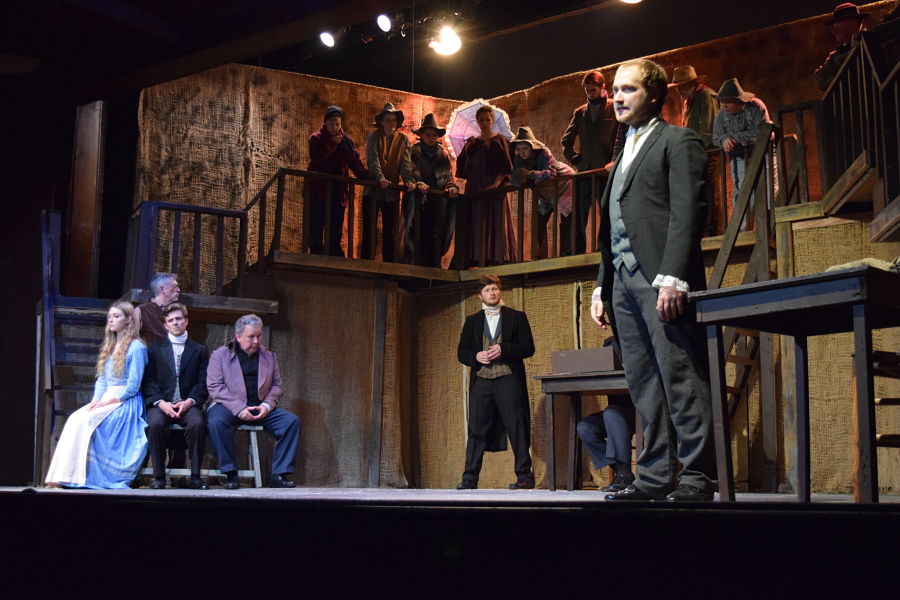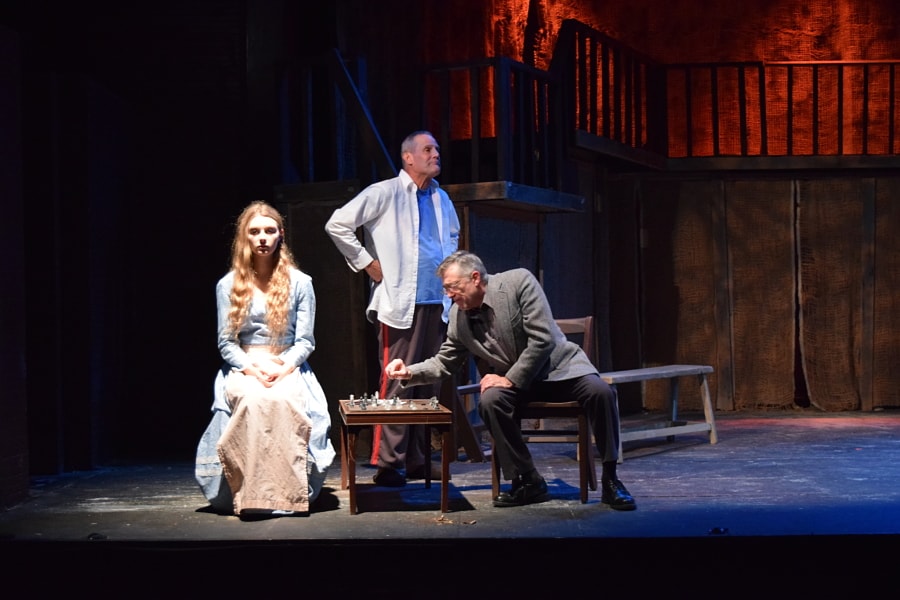Three headstones mark Charlie Silver’s grave, which sits on a sloping hill behind Kona Baptist Church in Bakersville, N.C. That’s because Charlie Silver’s remains were buried as they were discovered—after his wife, Frankie Silver, killed him in their tiny Appalachian cabin in 1831.
“When we talk about it being local, we’re not kidding,” says Andrew Gall, artistic director of Parkway Playhouse and director of The Ballad of Frankie Silver, which runs June 4-18 at the theatre in Burnsville, N.C. “I’m in the theatre right now, and if I got in the car, I could be where [the murder] happened in 10 minutes.” The historic crime is even closer than that, notes Gall: “We have a staff member who is related to Charlie Silver.”

Here’s what is definitively known about the crime: On Dec. 22, 1831, 18-year-old Frankie Silver killed her 19-year-old husband, Charlie Silver, with an axe. Over the following days, Frankie—possibly with the help of her mother and brother—attempted various methods to dispose of Charlie’s remains. None of them worked very well, hence the staggered burial he would receive. When Frankie was tried for the murder, she was quickly found guilty, and went to the gallows without ever giving her side of the story. A motive was never determined.
“There’s a lot of folklore and conflicting accounts of things, and that’s fine,” says Gall. “Nobody is every really going to know what happened. That’s what makes this so interesting from a storytelling standpoint—it’s open for interpretation.”
For the theatrical adaptation, Gall used another artist’s exploration of the story, Sharyn McCrumb’s 1998 novel, The Ballad of Frankie Silver. The book puts the tale within a new framework: A fictional sheriff in the late 1990s connects the legend with a case that he was involved with in the ’70s. Gall collaborated with McCrumb to adapt her novel for the stage.
“I felt compelled to write Frankie’s story because I wanted to know what really happened,” says McCrumb. “I was determined to research it until I could make sense of it.”
This isn’t the first time McCrumb and Gall have worked together; they previously collaborated on Parkway Playhouse’s Ghost Rider, an adaptation of McCrumb’s novel of the same name, in 2014. For The Ballad of Frankie Silver, Gall was instantly drawn to McCrumb’s novelization, which was his first exposure to the story. He says that McCrumb’s telling bothered him “in all the right ways that a story like that should bother you.” He continues: “The wonderful thing about Sharyn’s writing is she doesn’t come out and say, ‘This is bad,’ and she doesn’t do anything didactic with the narrative. I think that’s very exciting. It’s much more interesting to ask a really provocative question and then walk away from it.”
The Ballad of Frankie Silver finds modern relevance in its moral ambiguity. Gall cites “gender, class, and education” as the play’s primary concerns. Some say that Charlie physically abused Frankie, and that the murder was justifiable self-defense and retaliation. Following that interpretation, the legend becomes one of sexism complicating legal justice.

Gall has his own hopes for his audience’s interpretation.
“North Carolina has been in the news lately, and not necessarily in the way that we would like to be,” he says, referring to the recent controversial HB2 law that enforces assigned gender at birth over self-identified gender in the use of public bathrooms. “One of the big things that people from outside of North Carolina don’t understand about our region is that there’s this huge division between the urban and the rural,” Gall explains. “That’s something you see in the play, through classicism and how the proverbial ‘city’ characters from 1830, who make up the jury, respond to the ‘mountain’ characters of Frankie and Charlie.”
The HB2 issue is certainly one that local theatregoers will be aware of: A Parkway Playhouse production of West Side Story, slated for July, was recently cancelled after the show’s rights holders pulled all North Carolina production rights in protest of the law.
Still, traditional storytelling remains paramount for the production. (“Never get in the way of somebody telling a really good story,” says Gall.) For opening night, Parkway organized a special event, “See Where It Happened,” for which McCrumb presented her research on the Silver case before taking ticketholders on a trip to Charlie Silver’s gravesite. “The event sold out six weeks before the play’s opening, so I think the fascination with Frankie’s story is as strong as we supposed,” the author says.
Indeed, McCrumb’s story fits not only the deep tradition of Appalachian folklore and storytelling, but also into the ever-popular genre of true crime. McCrumb cites Truman Capote’s In Cold Blood, a paragon of the genre.
“Perry Smith, one of the killers [Capote] wrote about, said, ‘The rich never hang, only the poor and friendless,'” says McCrumb. “It was true in Frankie’s day, and in many cases it still is. I felt when I was researching this story that at the time Frankie Silver was hanged, no one particularly cared about her fate, but now they do.”
McCrumb has her own reason for caring: She herself has a distant family connection to Frankie Silver. “It isn’t justice,” says McCrumb of the novel and play. “But it’s something.”


